Emotionally Focused Therapy - EFT
Strengthen emotional bonds and build healthier relationships

If you feel like you and your partner are stuck having the same difficult conversations, you’re not alone. Emotions shape the heart of all relationships—bringing both connection and challenge. When intense feelings arise repeatedly, it can be easy to feel overwhelmed or helpless.
Emotionally Focused Therapy (EFT), developed by Dr. Sue Johnson and Dr. Leslie Greenberg, offers a compassionate and research-supported path for couples at Trillium Counselling.
EFT explores core emotions and unmet needs, helping partners understand the patterns that keep them apart and gently guiding them to shared understanding and connection.
Rooted in the science of attachment, EFT helps you and your partner safely examine how you connect, communicate, and support each other. By uncovering the deeper needs behind recurring conflicts, couples can reshape their relationship dynamics, nurture trust, and create more secure, fulfilling bonds.
What is Emotionally Focused Therapy?
Emotionally Focused Therapy (EFT) at Trillium Counselling helps couples and individuals create stronger, more secure relationships. Drawing on decades of attachment research, EFT guides you in understanding the emotional patterns that can keep you feeling distant or misunderstood.
With a compassionate therapist, you’ll learn to recognize and shift these cycles, building trust and deeper connection as you move forward together.

EFT is grounded in the science of human connection, using research on bonding to shine a light on how relationships function. By gently exploring the needs beneath painful emotions, you and your therapist can uncover what keeps certain issues unresolved—helping you find safer, more supportive ways to connect and create meaningful change together.
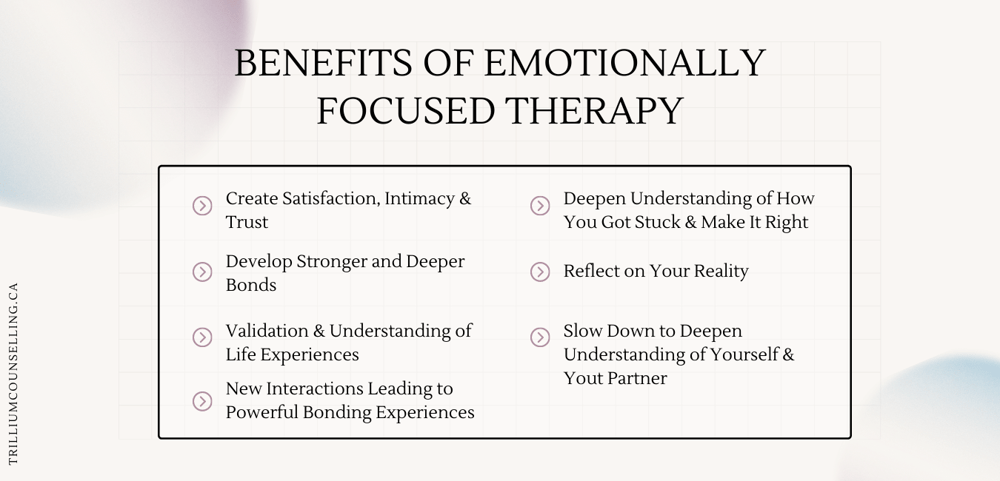
How EFT Therapy Works?
EFT takes a compassionate look at your entire relationship, helping couples identify where they’re getting stuck in negative cycles.
By working with emotions in the present moment, EFT guides you to shift your responses and build healthier, more supportive ways of connecting—creating meaningful change right within your sessions.
This process helps you and your partner notice the unhelpful cycles that keep you feeling disconnected and recognize the emotions and needs at the heart of each interaction.
As these patterns begin to shift, your therapist will help you understand your attachment styles and the needs beneath your emotions. Couples learn to share their feelings honestly and respond to each other with greater compassion and support.
The final step is consolidation, where couples practice and strengthen their new communication skills, creating healthier ways of connecting. With the therapist’s guidance and encouragement, partners build confidence using these tools, even when challenges arise, setting the stage for long-lasting positive change.
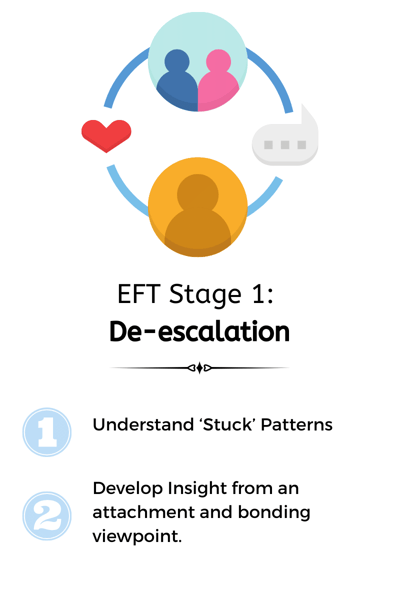
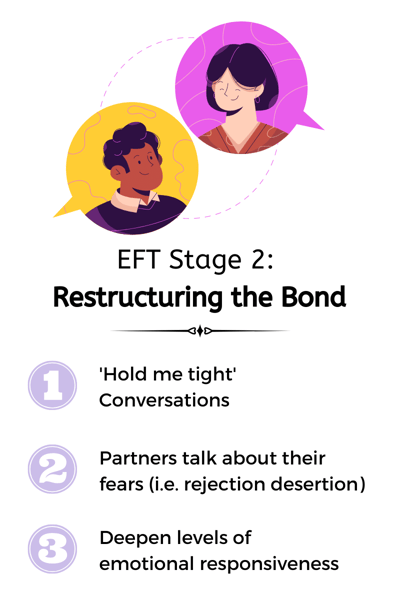
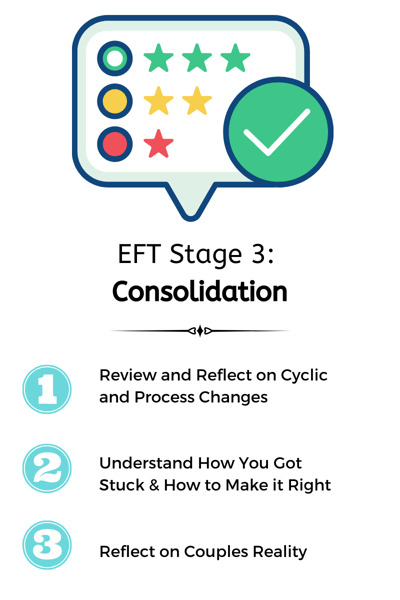
The goal of EFT is not just to change the way people fight, make them more able to negotiate or feel a little more satisfied with each other, the goal of EFT is to create a more secure emotional bond. Research has shown that EFT and clinical practice is effective in creating an increased security in the bond with your partner
- Sue Johnson
Lets us Help you Find the Right Match
Right Therapist, Right Plan, Real Support
What to Expect From An Emotionally Focused Therapy Session
An EFT therapist at Trillium Counselling will gently support you in exploring your emotional experiences more deeply, bringing awareness to feelings and needs that often go unspoken. Throughout each session, you’ll receive ongoing validation and compassionate guidance—helping you express what’s truly happening in the moment and inviting your partner to move forward with you in a new way.
By fostering safety and trust, your therapist helps you develop a more secure bond, using the proven steps of the EFT Tango to strengthen your connection and understanding.
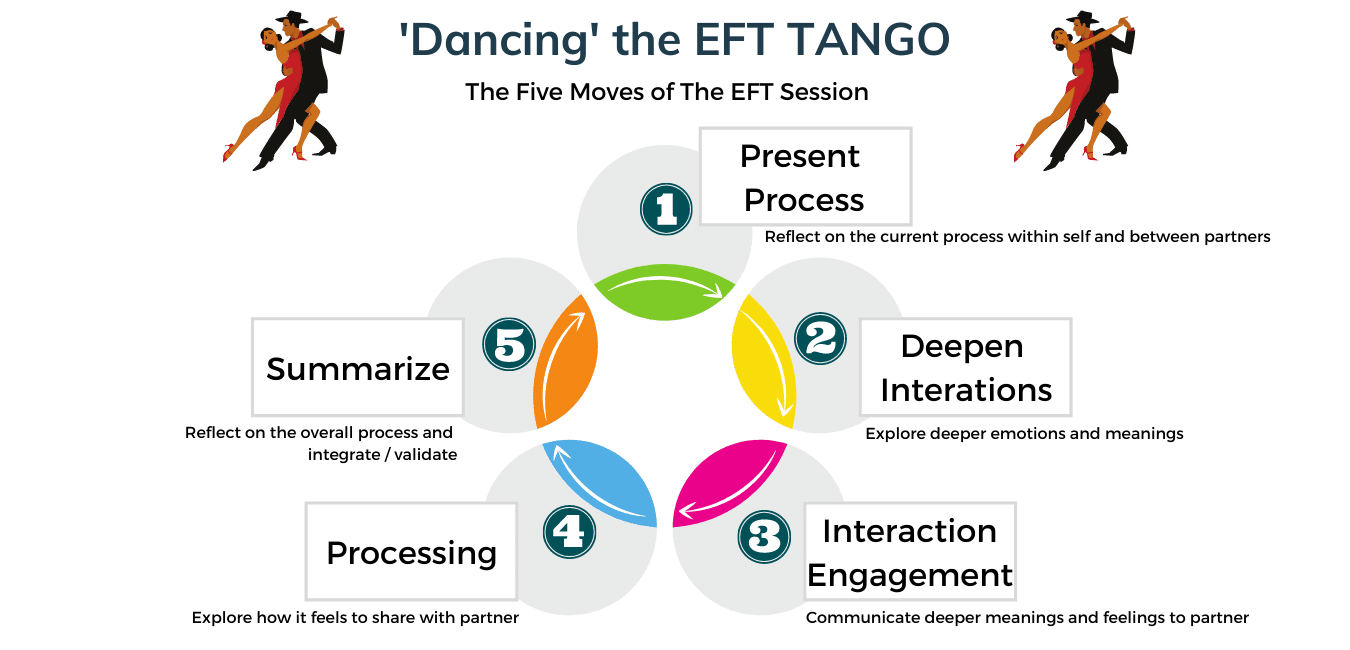
1. Present Process – Take time to notice what’s happening for yourself and your partner right now
In this stage, your therapist gently guides you to reflect on how you both react and respond to emotional moments as they arise. Together, you’ll focus on the patterns of interaction and how you each process emotions during tough conversations—creating space for understanding, empathy, and change.


2. Deepen Interaction – Uncover and share your deeper emotions
Your therapist will help you explore what’s truly happening beneath the surface, gently clarifying the feelings and needs that drive your responses. Together, you’ll learn to communicate these deeper emotions with openness and care—creating new possibilities for connection and understanding between you and your partner.
3. Interaction Engagement – Express and share deeper feelings with your partner
In this stage, you’ll learn to communicate what’s truly beneath the surface, sharing newly discovered feelings and insights to foster deeper empathy, understanding, and connection within your relationship.


4. Processing – Explore how it feels to share with partner
“What was it like to communicate this meaning to your partner? That must have been scary” … “What was it like for you as his/her partner to hear that?”
“I can hear her/him, at least I know I’m not the only one afraid, there has been years of hurt in this relationship”
These new, heartfelt exchanges create moments of true connection, helping both partners experience greater safety and closeness. Over time, this process gently breaks old patterns of disconnection, paving the way for more supportive and nurturing ways of relating.
5. Summarize – Celebrate growth and strengthen connection
Your EFT therapist will help you reflect on the progress you’ve made together, highlighting new understanding, deeper emotional bonds, and the positive changes you’ve built as a couple. This final step supports you in integrating these new patterns, fostering a lasting sense of connection and trust.

The Benefits of Emotionally Focused Therapy for Couples
It’s natural to feel a bit overwhelmed by the idea of exploring deep emotions or shifting long-held patterns. While Emotionally Focused Therapy does take commitment, it doesn’t mean years of hard work ahead.
Most couples experience meaningful, lasting changes within eight to twenty sessions. In this supportive space, you’ll begin to build safer, more trusting connections—laying the foundation for greater intimacy and satisfaction in your relationship.

Research shows that even in this limited time frame, it EFT Therapy helps people create safe and secure bonds, resulting in more trust, intimacy, and satisfaction.
Emotionally Focused Therapy has been shown to create real, lasting change for couples—helping most partners move from distress to genuine connection.
By reducing defensive reactions and building emotional safety, EFT empowers couples to better understand themselves and each other. This leads to more compassionate, supportive, and fulfilling relationships grounded in trust, empathy, and respect.
FAQs
Therapy works best when the 'fit' is right with your therapist. That’s why we carefully match you with someone whose expertise fits your needs and preferences. Building a strong therapeutic relationship is key to creating a supportive and effective experience.
Before meeting your therapist, you’ll complete a brief intake form. Your first 50‑minute session focuses on what brings you in, your goals, relevant history, and what success would look like. We’ll explain confidentiality and co‑create a plan so you know what comes next. It’s normal to feel nervous—your therapist will guide the pace.
The frequency of sessions depends on your needs and goals. Many people start with weekly or bi-weekly appointments and adjust as they make progress. The total number of sessions is unique to you—your therapist will work with you to find the right approach.
In Emotionally Focused Therapy (EFT) for couples at Trillium Counselling, the focus is on deepening your emotional bond and nurturing lasting security in your relationship. Each session is a collaborative, compassionate space designed to help you both explore and understand the emotions that influence your connection.
Your therapist will:
- Foster a welcoming environment where both partners feel truly seen and valued.
- Help you recognize the negative cycles that fuel distance and misunderstandings.
- Guide you in sharing vulnerable feelings safely, opening the door to greater closeness and empathy.
- Encourage new patterns of trust, emotional responsiveness, and support.
With time, EFT can help you break free from cycles of conflict and move toward a more resilient, fulfilling partnership.
Most of our services are covered by extended health benefit plans. Coverage varies with every plan, so please check your specific plan or contact your provider to confirm your benefits.
Most employer benefits cover therapy with a Registered Social Worker (MSW, RSW) or a Registered Psychotherapist (RP). We can direct bill to most major insurers when your plan allows it; otherwise, we email insurance‑ready receipts after your session.

Last Reviewed July 22 2024 by Rosemary Victor
Rosemary holds a Masters of Social Work degree in addition to post-graduate training from the Traumatology Institute as a Clinical Traumatologist. Rosemary also completed a post-graduate certification in Cognitive Behaviour Therapy from Wilfrid Laurier University.Rosemary has experience in a variety of areas with specific knowledge in couples therapy, coping with depression, grief and loss, anxiety disorders, managing life transitions, trauma and addictions.
Not sure yet? Let’s talk it through.
If you’d like to ask questions or explore your options first, book a free 20-minute matching consult or give us a call (226-752-8857) . One of our team members will help you find the right therapist and next steps that feel comfortable for you.
%20(1).png?width=200&height=80&name=Trillium%20Counselling%20Logo%20(999%20x%20398%20px)%20(1).png)

















